人教版九年级英语第十二单元Unit 12 Life is full of the unexpected Section A(1a-2d)(共45张PPT)
文档属性
| 名称 | 人教版九年级英语第十二单元Unit 12 Life is full of the unexpected Section A(1a-2d)(共45张PPT) | 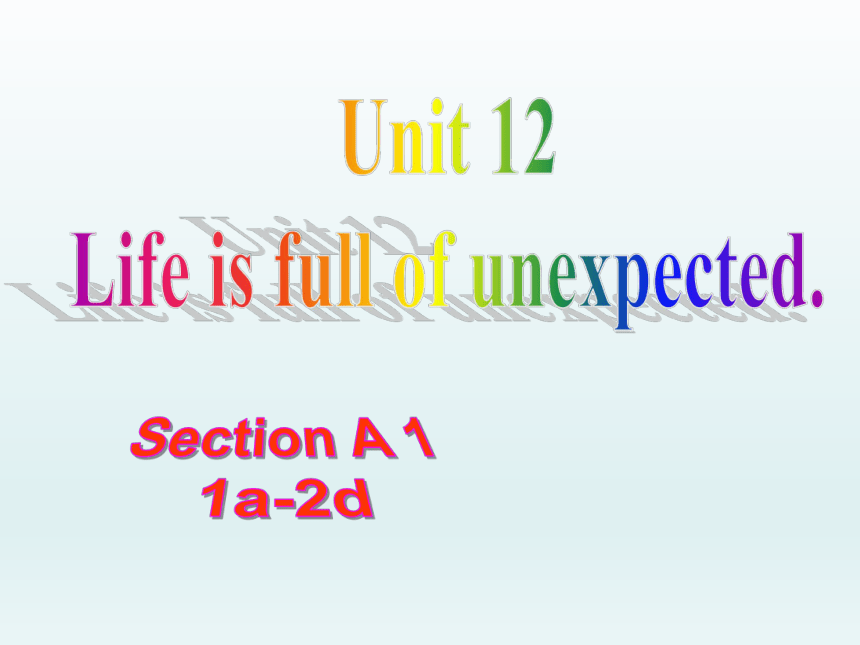 | |
| 格式 | zip | ||
| 文件大小 | 2.4MB | ||
| 资源类型 | 教案 | ||
| 版本资源 | 人教新目标(Go for it)版 | ||
| 科目 | 英语 | ||
| 更新时间 | 2022-10-23 19:58:28 | ||
图片预览


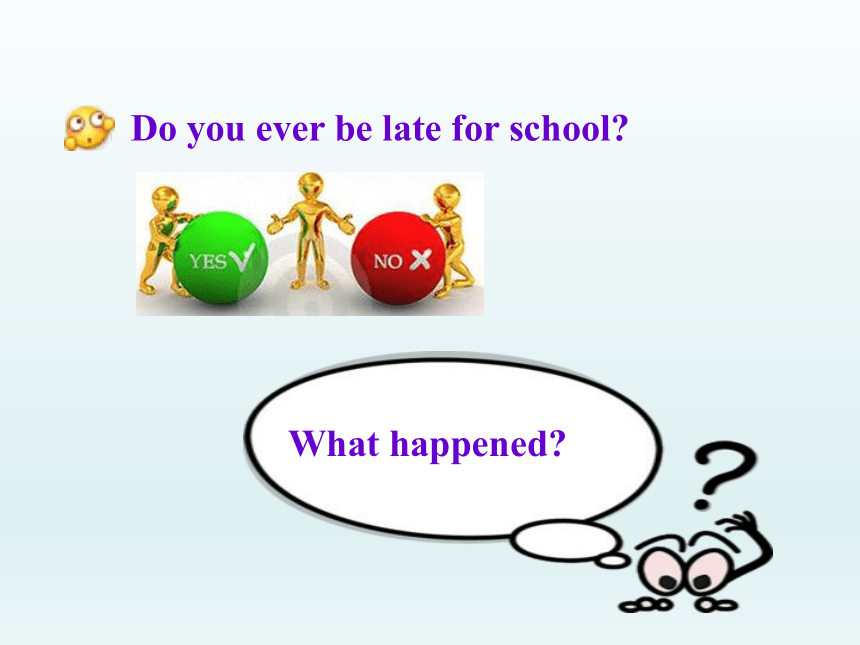

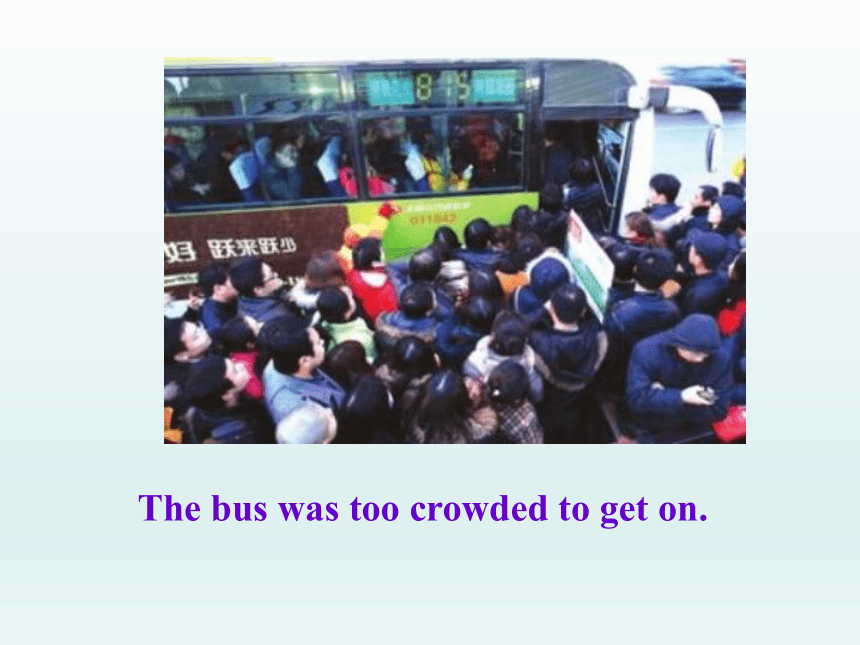
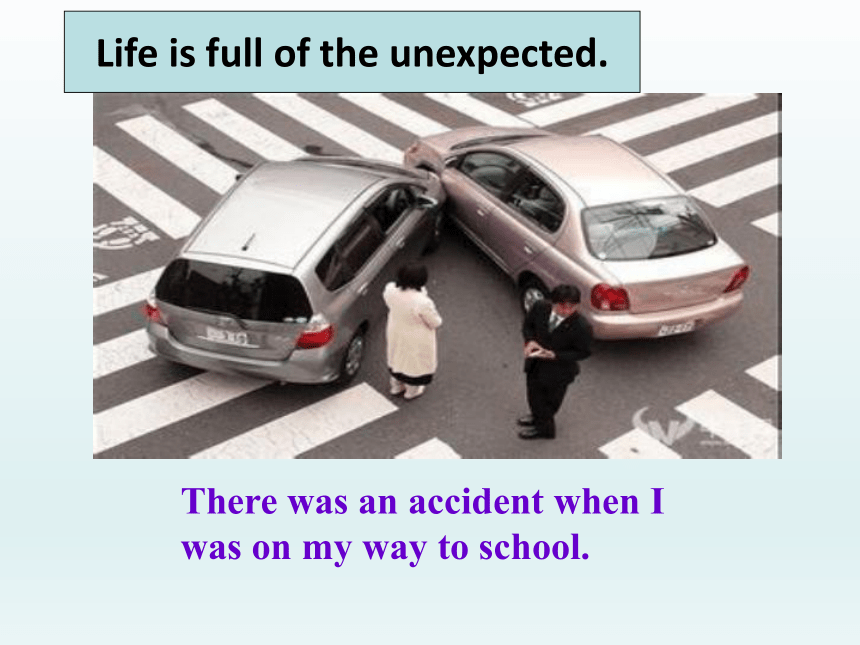



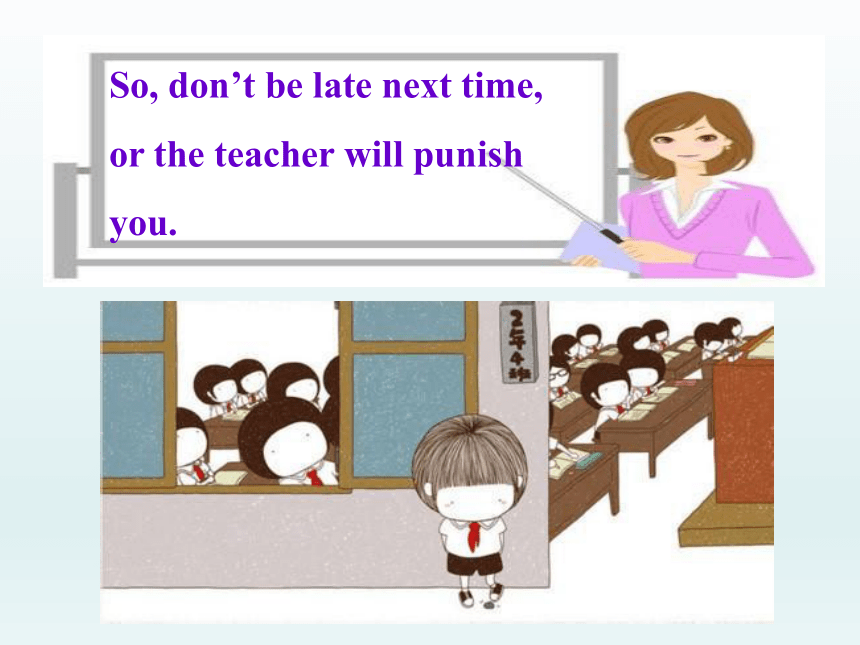
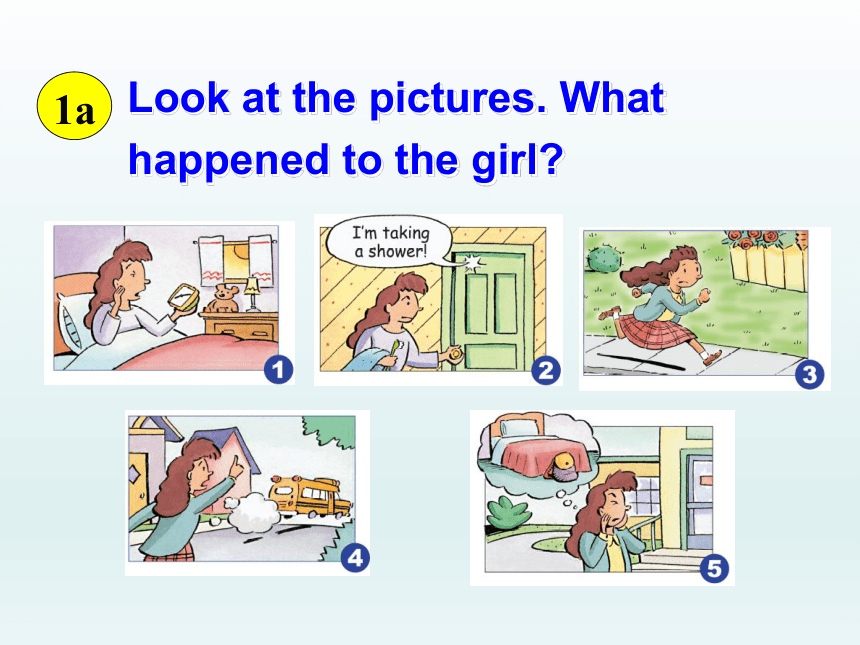
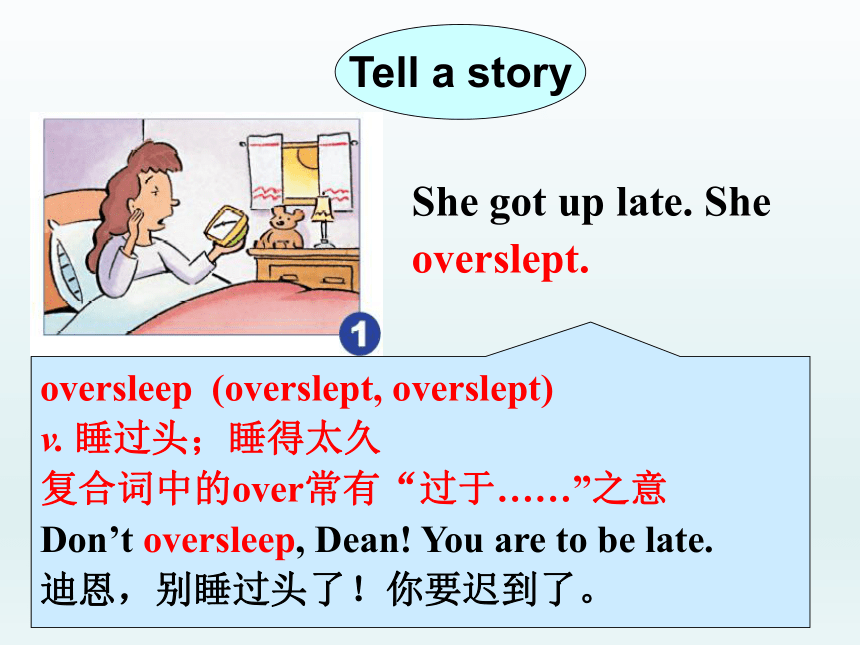
文档简介
(共45张PPT)
Learn how to narrate
past events.
Do you ever be late for school
What happened
I overslept.
The bus was too crowded to get on.
There was an accident when I was on my way to school.
Life is full of the unexpected.
I forgot to take my schoolbag!
I left my schoolwork in my house! I had to go back and get it !
I thought it was Saturday, but actually it was Friday!
So, don’t be late next time,
or the teacher will punish
you.
1a
Look at the pictures. What happened to the girl
She got up late. She overslept.
Tell a story
oversleep (overslept, overslept)
v. 睡过头;睡得太久
复合词中的over常有“过于……”之意
Don’t oversleep, Dean! You are to be late.
迪恩,别睡过头了!你要迟到了。
By the time she got up, someone had already gotten in the bathroom.
在……以前
She rushed out the door.
The bus had left
before she got to the station.
n. 背包;旅行包
When she got to school, she realized she had left her backpack at home. ….
1. By the time I got up, my brother _____ already _______ in the shower.
2. By the time I got outside, the bus _____ already ______.
3. When I got to school, I realized I _____ ______ my backpack at home.
1b
Listen to Mary talking about her plete the sentences.
had
gotten
had
left
had
left
Boy: Hi, Mary. You look so tired.
Mary: I am. I had a bad morning.
Boy: Really What happened
Mary: Well, first of all I ___________. By the time I got up, my brother _____ already _______ in the shower.
Boy: Oh, what a pain!
Mary: So, after he got out of the shower, I took a quick shower and got dressed. But by the time I ________outside, the bus _______ already _________.
Boy: Oh, no!
Mary: Oh, yes! So I ran all the way to school. But when I got to school, I ________ I _____________ my backpack at home.
Boy: No wonder you look stressed.
overslept
had
gotten
realized
had
went
left
had left
过去完成时
(1) 构成:由“助动词had(用于各种人称和数) + 过去分词”构成
否定式:had not + 过去分词
缩写形式:hadn’t
(2) 用法:过去完成时表示在过去某一时间或动作之前已经发生或完成了的动作。
(3) 它所表示动作发生的时间是“过去的过去”。
① 表示过去某一时间可用by, before 等构成的短语来表示。
② 也可以用when, before 等引导的时间状语从句来表示。
③ 还可以通过状语从句或通过上下文暗示。
例如:
When I got there, you had already eaten your meal.
当我到达那里时,你已经开始吃了。
By the time he got here, the bus had left.
在他到达那里之前,汽车已经离开了。
2a
Listen to Mary continue her story. Number the pictures [1-4] in the correct order.
4
3
1
2
2b
Fill in the blanks with the correct forms of the verbs in brackets. Then listen again and check your answers.
1. When I _______ (get) home, I realized I ________ (leave) my keys in the backpack.
2. By the time I _____ (get) back to school, the bell _________ (ring).
3. By the time I _______ (walk) into class, the teacher __________ (start) teaching already.
got
had left
got
had rung
walked
had started
By the time she got home, she realized that she had left the keys in the backpack.
When she got to school,
she realized she had left her
backpack at home.
By the time she got back to school, the bell had rung.
By the time she walked into class, the teacher has started teaching already.
2d
Role-play the conversation.
Why were you late for class today, Kevin
My alarm clock didn’t go off! I kept sleeping, and when I woke up it was already 8:00 a.m.!
Oh, no!
So I just quickly put on some clothes and rushed out the door.
You didn’t eat breakfast
No, I didn’t even brush my teeth or wash my face! But before I got to the bus stop, the bus had already left.
Then how did you get here
Luckily, Carl’s dad saw me on the street and gave me a lift in his car.
Well, at least by the time you got to school, you were only five minutes late for class.
1. Life is full of the unexpected.
unexpected adj. 出乎意料的;始料不及的
e.g. It will not be unexpected if Tom comes late again, because he is always like this.
如果汤姆又迟到了,一点也不意 外,因为他一向如此。
the unexpected 为名词化的形容词,意为
“出乎意料的事”。 英语中,有些形容词与定冠词the连用,表示一类人或事物,在句子中起名词的作用。
例:the homeless (无家可归者)
the disabled(残疾人)
the unwanted( 无人认领物品)
当名词化的形容词用作主语时,谓语动词的单复数形式取决于它们所表示的概念的单复数情况。 多数情况下,表示一类人或物品时,谓语动词用复数;少数情况下,当指抽象概念或不可数的物品及事件时,谓语动词用单数。
例:The sick are always taken good care of in that hospital. 在那家医院里病人们总是受到很好的照顾。(the sick=the sick people)
(2) 这种结构中的形容词虽已名词化,但其语言
行为仍具有极强的形容词特征,受到副词修饰
或具有比较的特征。
例:The severely disabled need full-time care.重
度残疾人需要全天候拌护。
He is spoiled, and always asks for the most
expensive.
他被惯坏了,总是嚷着要最贵的东西。
(3) 名词化的形容词前面一般用定冠词the. 但
若由and链接(两形容词往往为反义词),
成对的使用时,又通常被省略。
例: He is popular with both young and old.
老老少少都喜欢他。
It is said that the man was widely
respected by both rich and poor.
据说那个人颇收人尊敬,无论是穷人还
是富人。
2. By the time I got up, my brother ______
already ______ in the shower. 我起床时,我弟弟已经进入浴室了。
“by the time”表示“当/到……时”,引导时间状语从句。如果从句中用了一般过去时,主语中常用过去完成时;如果主句中用了将来时,从句中常用一般现在时表将来。
例:By the time I got up, he had already left.
当我起床时,他已经离开了。
He will be a teacher by the time he is
twenty.
到他二十岁时,他会成为一名教师。
【拓展】
by now
表示
“到现在为止”
,
通常与现在完成时
连用。
By now I have collected 200 dolls.
到现在为止,
我已收集了二百个布娃娃。
【拓展】
by now
表示
“到现在为止”
,
通常与现在完成时
连用。
By now I have collected 200 dolls.
到现在为止,
我已收集了二百个布娃娃。
【拓展】
by now
表示
“到现在为止”
,
通常与现在完成时
连用。
By now I have collected 200 dolls.
到现在为止,
我已收集了二百个布娃娃。
by now 表示“到现在为止”,通常与 现在完成时连用。
例:By now I have collected 200 dolls.
到现在为止,我已收集了二百个
布娃娃。
3.When I got to school, I realized I ______
______ my backpack at home. 当我到学校时我意识到我把书包忘在家里了。
表示“把某物忘在某处”要用词组leave sth. +地点。
forget意为“遗忘某物”,指忘记一件具体的东西,但不能有具体的地点。
例:I my______ book on the desk.
我把书忘在了桌 子上。
I______ my umbrella yesterday .
我昨天忘了带伞。
left
forgot
【辨析】leave 与forget的用法: (1) leave “ 遗留,落下,忘记带”,侧重指把某物或某人留在某个地方,后常跟地点状语; (2)forget “ 忘记”,侧重指忘记某件事情,后常跟to do (忘了要去做)或doing (忘了做过)。 【拓展】 leave → left → left v 离开 (1)leave sth +地点 把某物遗忘在某地
(2)leave for +地点 离开去某地 (3) leave a message 留言
ask for leave 请假
leave school (中学) 毕业 (4)leave one by oneself=leave sb alone
把某人单独留下
3. So I just quickly put on some clothes and rushed out the door.
rush out 冲出去,冲出……
e.g. Henry rushed out the room and disappeared in the rain.
Julia rushed out and didn’t return.
亨利冲出房间,消失在了雨中。
朱丽叶冲了出去,再没回来。
My
alarm
clock
didn
’
t
go
off!
我的闹钟没
响。
go off
意为“发出响声”
。
Something was wrong with my alarm clock and it
didn
’
t go off.
我的闹钟出毛病了,它没有响。
4. My alarm clock didn’t go off! 我的闹钟没响。
go off 意为“发出响声”。
例:Something was wrong with my alarm
clock and it didn’t go off.
⑴
go by
意为“
(
时间
)
过去;消逝”
。
Time goes by second by second.
时间一秒秒地消
逝。
⑵
go on
继续
Please go on working.
请继续工作。
go off 还可以表示“(电灯)熄灭;(电)中断;(食物)变坏,变质;(质量)下降”。
Milk goes off quickly in hot weather.
我的闹钟出毛病了,它没有响。
go over 复习
go away 离开
go by (时间)过去
go for a walk 出去散步 go fishing/shopping/skating/swimming
去钓鱼/去买东西/去溜冰/去游泳
⑴ go by 意为“(时间)过去;消逝”。
例:Time goes by second by second.
时间一秒秒地消逝。
⑵ go on 意为“继续”。
例:Please go on working.
请继续工作。
5. Carl’s dad saw me on the street and gave me
a lift in his car. Carl的爸爸在街上看到我,
捎了我一程。
give sb. a lift 是动词短语,意为“捎某人一程”,
相当于give sb. a ride / give a ride to sb.
例:I’m a little late, can you give me a lift, dad
我要迟到了,你能捎我一程吗,爸爸?
Jim gave me a lift on my way home yesterday.
吉姆昨天在我回家的路上捎了我一程。
get dressed 穿衣服,表示自己穿衣服
Hurry up and get dressed.
No wonder (that) =It’s no wonder (that) 奇怪;怪不得
No wonder you ’re late.
用方框内短语的适当形式填空。
1. Tom __________, running after his brother in the dark night yesterday.
2. __________ I was 10, I had been able to either play piano or violin.
3. _________, Sammy! It has been late for you to go to school.
rushed out
By the time
Wake up
by the time, wake up, rush out
根据句意和汉语提示,填写单词。
1. There will be an __________ (意外的) surprise.
2. The children _________ (冲,奔) out the school when the bell rang.
3. Yesterday the girl ________ (违反) the rule and her teacher was angry.
4. When I was about to read my book, I found I ________ (忘了带) it at home.
unexpected
rushed
broke
had left
3. 到昨晚上,他已写完那封信。
By yesterday evening he ___________ (write) that letter.
4. 他说他以前见过你。
He said that he ____________(see) you before.
5. 当我进来时,他已做完了作业。
When I came in, he ________________(finish) his homework.
had written
had seen
had finished
1. 她到家之前她的孩子已经睡着了。
When she got home her children, ____________(sleep).
2. 在他们到达之前电影已经开始了。
Before they arrived here, the film _________ already ___________ (start).
had slept
had
started
用第三人称介绍Mary的早晨,并把它写下来。
Learn how to narrate
past events.
Do you ever be late for school
What happened
I overslept.
The bus was too crowded to get on.
There was an accident when I was on my way to school.
Life is full of the unexpected.
I forgot to take my schoolbag!
I left my schoolwork in my house! I had to go back and get it !
I thought it was Saturday, but actually it was Friday!
So, don’t be late next time,
or the teacher will punish
you.
1a
Look at the pictures. What happened to the girl
She got up late. She overslept.
Tell a story
oversleep (overslept, overslept)
v. 睡过头;睡得太久
复合词中的over常有“过于……”之意
Don’t oversleep, Dean! You are to be late.
迪恩,别睡过头了!你要迟到了。
By the time she got up, someone had already gotten in the bathroom.
在……以前
She rushed out the door.
The bus had left
before she got to the station.
n. 背包;旅行包
When she got to school, she realized she had left her backpack at home. ….
1. By the time I got up, my brother _____ already _______ in the shower.
2. By the time I got outside, the bus _____ already ______.
3. When I got to school, I realized I _____ ______ my backpack at home.
1b
Listen to Mary talking about her plete the sentences.
had
gotten
had
left
had
left
Boy: Hi, Mary. You look so tired.
Mary: I am. I had a bad morning.
Boy: Really What happened
Mary: Well, first of all I ___________. By the time I got up, my brother _____ already _______ in the shower.
Boy: Oh, what a pain!
Mary: So, after he got out of the shower, I took a quick shower and got dressed. But by the time I ________outside, the bus _______ already _________.
Boy: Oh, no!
Mary: Oh, yes! So I ran all the way to school. But when I got to school, I ________ I _____________ my backpack at home.
Boy: No wonder you look stressed.
overslept
had
gotten
realized
had
went
left
had left
过去完成时
(1) 构成:由“助动词had(用于各种人称和数) + 过去分词”构成
否定式:had not + 过去分词
缩写形式:hadn’t
(2) 用法:过去完成时表示在过去某一时间或动作之前已经发生或完成了的动作。
(3) 它所表示动作发生的时间是“过去的过去”。
① 表示过去某一时间可用by, before 等构成的短语来表示。
② 也可以用when, before 等引导的时间状语从句来表示。
③ 还可以通过状语从句或通过上下文暗示。
例如:
When I got there, you had already eaten your meal.
当我到达那里时,你已经开始吃了。
By the time he got here, the bus had left.
在他到达那里之前,汽车已经离开了。
2a
Listen to Mary continue her story. Number the pictures [1-4] in the correct order.
4
3
1
2
2b
Fill in the blanks with the correct forms of the verbs in brackets. Then listen again and check your answers.
1. When I _______ (get) home, I realized I ________ (leave) my keys in the backpack.
2. By the time I _____ (get) back to school, the bell _________ (ring).
3. By the time I _______ (walk) into class, the teacher __________ (start) teaching already.
got
had left
got
had rung
walked
had started
By the time she got home, she realized that she had left the keys in the backpack.
When she got to school,
she realized she had left her
backpack at home.
By the time she got back to school, the bell had rung.
By the time she walked into class, the teacher has started teaching already.
2d
Role-play the conversation.
Why were you late for class today, Kevin
My alarm clock didn’t go off! I kept sleeping, and when I woke up it was already 8:00 a.m.!
Oh, no!
So I just quickly put on some clothes and rushed out the door.
You didn’t eat breakfast
No, I didn’t even brush my teeth or wash my face! But before I got to the bus stop, the bus had already left.
Then how did you get here
Luckily, Carl’s dad saw me on the street and gave me a lift in his car.
Well, at least by the time you got to school, you were only five minutes late for class.
1. Life is full of the unexpected.
unexpected adj. 出乎意料的;始料不及的
e.g. It will not be unexpected if Tom comes late again, because he is always like this.
如果汤姆又迟到了,一点也不意 外,因为他一向如此。
the unexpected 为名词化的形容词,意为
“出乎意料的事”。 英语中,有些形容词与定冠词the连用,表示一类人或事物,在句子中起名词的作用。
例:the homeless (无家可归者)
the disabled(残疾人)
the unwanted( 无人认领物品)
当名词化的形容词用作主语时,谓语动词的单复数形式取决于它们所表示的概念的单复数情况。 多数情况下,表示一类人或物品时,谓语动词用复数;少数情况下,当指抽象概念或不可数的物品及事件时,谓语动词用单数。
例:The sick are always taken good care of in that hospital. 在那家医院里病人们总是受到很好的照顾。(the sick=the sick people)
(2) 这种结构中的形容词虽已名词化,但其语言
行为仍具有极强的形容词特征,受到副词修饰
或具有比较的特征。
例:The severely disabled need full-time care.重
度残疾人需要全天候拌护。
He is spoiled, and always asks for the most
expensive.
他被惯坏了,总是嚷着要最贵的东西。
(3) 名词化的形容词前面一般用定冠词the. 但
若由and链接(两形容词往往为反义词),
成对的使用时,又通常被省略。
例: He is popular with both young and old.
老老少少都喜欢他。
It is said that the man was widely
respected by both rich and poor.
据说那个人颇收人尊敬,无论是穷人还
是富人。
2. By the time I got up, my brother ______
already ______ in the shower. 我起床时,我弟弟已经进入浴室了。
“by the time”表示“当/到……时”,引导时间状语从句。如果从句中用了一般过去时,主语中常用过去完成时;如果主句中用了将来时,从句中常用一般现在时表将来。
例:By the time I got up, he had already left.
当我起床时,他已经离开了。
He will be a teacher by the time he is
twenty.
到他二十岁时,他会成为一名教师。
【拓展】
by now
表示
“到现在为止”
,
通常与现在完成时
连用。
By now I have collected 200 dolls.
到现在为止,
我已收集了二百个布娃娃。
【拓展】
by now
表示
“到现在为止”
,
通常与现在完成时
连用。
By now I have collected 200 dolls.
到现在为止,
我已收集了二百个布娃娃。
【拓展】
by now
表示
“到现在为止”
,
通常与现在完成时
连用。
By now I have collected 200 dolls.
到现在为止,
我已收集了二百个布娃娃。
by now 表示“到现在为止”,通常与 现在完成时连用。
例:By now I have collected 200 dolls.
到现在为止,我已收集了二百个
布娃娃。
3.When I got to school, I realized I ______
______ my backpack at home. 当我到学校时我意识到我把书包忘在家里了。
表示“把某物忘在某处”要用词组leave sth. +地点。
forget意为“遗忘某物”,指忘记一件具体的东西,但不能有具体的地点。
例:I my______ book on the desk.
我把书忘在了桌 子上。
I______ my umbrella yesterday .
我昨天忘了带伞。
left
forgot
【辨析】leave 与forget的用法: (1) leave “ 遗留,落下,忘记带”,侧重指把某物或某人留在某个地方,后常跟地点状语; (2)forget “ 忘记”,侧重指忘记某件事情,后常跟to do (忘了要去做)或doing (忘了做过)。 【拓展】 leave → left → left v 离开 (1)leave sth +地点 把某物遗忘在某地
(2)leave for +地点 离开去某地 (3) leave a message 留言
ask for leave 请假
leave school (中学) 毕业 (4)leave one by oneself=leave sb alone
把某人单独留下
3. So I just quickly put on some clothes and rushed out the door.
rush out 冲出去,冲出……
e.g. Henry rushed out the room and disappeared in the rain.
Julia rushed out and didn’t return.
亨利冲出房间,消失在了雨中。
朱丽叶冲了出去,再没回来。
My
alarm
clock
didn
’
t
go
off!
我的闹钟没
响。
go off
意为“发出响声”
。
Something was wrong with my alarm clock and it
didn
’
t go off.
我的闹钟出毛病了,它没有响。
4. My alarm clock didn’t go off! 我的闹钟没响。
go off 意为“发出响声”。
例:Something was wrong with my alarm
clock and it didn’t go off.
⑴
go by
意为“
(
时间
)
过去;消逝”
。
Time goes by second by second.
时间一秒秒地消
逝。
⑵
go on
继续
Please go on working.
请继续工作。
go off 还可以表示“(电灯)熄灭;(电)中断;(食物)变坏,变质;(质量)下降”。
Milk goes off quickly in hot weather.
我的闹钟出毛病了,它没有响。
go over 复习
go away 离开
go by (时间)过去
go for a walk 出去散步 go fishing/shopping/skating/swimming
去钓鱼/去买东西/去溜冰/去游泳
⑴ go by 意为“(时间)过去;消逝”。
例:Time goes by second by second.
时间一秒秒地消逝。
⑵ go on 意为“继续”。
例:Please go on working.
请继续工作。
5. Carl’s dad saw me on the street and gave me
a lift in his car. Carl的爸爸在街上看到我,
捎了我一程。
give sb. a lift 是动词短语,意为“捎某人一程”,
相当于give sb. a ride / give a ride to sb.
例:I’m a little late, can you give me a lift, dad
我要迟到了,你能捎我一程吗,爸爸?
Jim gave me a lift on my way home yesterday.
吉姆昨天在我回家的路上捎了我一程。
get dressed 穿衣服,表示自己穿衣服
Hurry up and get dressed.
No wonder (that) =It’s no wonder (that) 奇怪;怪不得
No wonder you ’re late.
用方框内短语的适当形式填空。
1. Tom __________, running after his brother in the dark night yesterday.
2. __________ I was 10, I had been able to either play piano or violin.
3. _________, Sammy! It has been late for you to go to school.
rushed out
By the time
Wake up
by the time, wake up, rush out
根据句意和汉语提示,填写单词。
1. There will be an __________ (意外的) surprise.
2. The children _________ (冲,奔) out the school when the bell rang.
3. Yesterday the girl ________ (违反) the rule and her teacher was angry.
4. When I was about to read my book, I found I ________ (忘了带) it at home.
unexpected
rushed
broke
had left
3. 到昨晚上,他已写完那封信。
By yesterday evening he ___________ (write) that letter.
4. 他说他以前见过你。
He said that he ____________(see) you before.
5. 当我进来时,他已做完了作业。
When I came in, he ________________(finish) his homework.
had written
had seen
had finished
1. 她到家之前她的孩子已经睡着了。
When she got home her children, ____________(sleep).
2. 在他们到达之前电影已经开始了。
Before they arrived here, the film _________ already ___________ (start).
had slept
had
started
用第三人称介绍Mary的早晨,并把它写下来。
同课章节目录
- Unit 1 How can we become good learners.
- Section A
- Section B
- Unit 2 I think that mooncakes are delicious!
- Section A
- Section B
- Unit 3 Could you please tell me where the restroom
- Section A
- Section B
- Unit 4 I used to be afraid of the dark.
- Section A
- Section B
- Unit 5 What are the shirts made of?
- Section A
- Section B
- Review of Units 1-5
- Unit 6 When was it invented?
- Section A
- Section B
- Unit 7 Teenagers should be allowed to choose their
- Section A
- Section B
- Unit 8 It must belong to Carla.
- Section A
- Section B
- Unit 9 I like music that I can dance to.
- Section A
- Section B
- Unit 10 You're supposed to shake hands.
- Section A
- Section B
- Review of Units 6-10
- Unit 11 Sad movies make me cry.
- Section A
- Section B
- Unit 12 Life is full of the unexpected
- Section A
- Section B
- Unit 13 We're trying to save the earth!
- Section A
- Section B
- Unit 14 I remember meeting all of you in Grade 7.
- Section A
- Section B
- Review of Units 11-14
